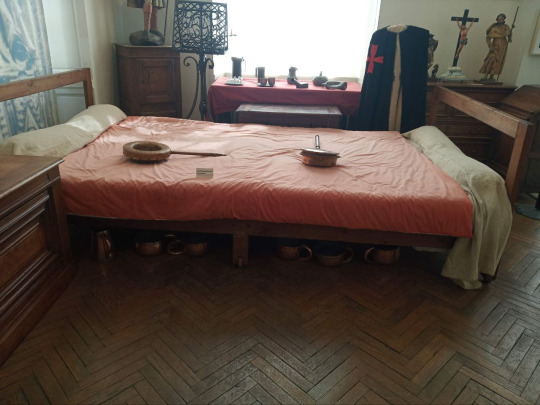#1.1.2
Text

bishop myriel and madame magloire in 1.1.2
#les mis letters#les mis#bishop myriel#madame magloire#okay last post before bed. promise#this image entered my head and Would Not Leave#1.1.2
584 notes
·
View notes
Text
Bandai Releases Tamagotchi Uni Version 1.1.2 Update

Another update is here! This update seems to be a lot smaller than the previous and first update. Version 1.1.2 will fix a big where Tamagotchi characters in the Tamaverse would not update. Most likely this means that users were seeing the same characters throughout the Tamaverse and that was in fact a bug!

It’s so simple to update too, from the menu, select the network icon -> update -> check for update.
Let us know if you find any other cool new features in the update! Happy updating!
#tamapalace#tamagotchi#tmgc#tamagotchiuni#tamagotchi uni#uni#tamatag#virtualpet#bandai#update#1.1.2#softwareupdate#software update#ota
21 notes
·
View notes
Text
Not to be full analysis mode but I do love how the bishop’s palace is described so intricately before immediately being cut with: “The hospital was a narrow two-story building with a small garden”. Idk the contrast itches my brain
#(I’m using the Fahnstock and MacAfee translation btw since I have it physically)#les miserables#les mis letters#1.1.2#literary analysis#bern speaks
26 notes
·
View notes
Text
Round 1 Stage 1 Poll 2


The Braan, Wildemount: The Braan is a small stone giant settlement in the Penumbra Range, Xhorhas. The Mighty Nein helped them with a demon problem.
image from c2e59
Draconia, Wildemount: Draconia was only recently destroyed, in 810PD, during the Chroma Crisis. It was the hometown of Vox Machina's Tiberius Stormwind, and one of the few Post-Divergence flying cities.
#exandria#the braan#braan#draconia#wildemount#critical role#poll post#notpollprop#exandria city showdown#round 1#1.1.2
4 notes
·
View notes
Text
Something that annoys me every time I read les mis chapter 1.1.2 is that there's consistently an error in the English translation. the hospital (which becomes the bishops house) is referred to ad a "single-storey building" / "building with one floor" or similar, when in subsequent chapters its made very clear that it has two storeys, with baptistine sleeping up above. I'm p sure this comes from a serial misinterpretation of the French original "étage", meaning just an upper floor
11 notes
·
View notes
Text

m. bienvenue my beloved
#les mis letters#the next dozen entries are a continuation in this vein and i for one cannot wait#les miz#the brick#les misérables#les mis#lm 1.1.2
1K notes
·
View notes
Text
I gotta do a things I'm noticing on my leverage rewatch masterlist but literally just in the first two eps I think the things I love the most are that they are, every single one of them, here to cause chaos FIRST. oho the congressman is obsessed with his house is he? Hey, can I borrow your phone? It would be a shame :3 if something :3 happened to his mahogany wood panels :3
and it's simple!! Eliot makes one (1) phone call in the name of making trouble and it gets folded into the con seamlessly. He throws a rock at a camera. Parker's skills are showcased in how you never see her working - one moment the picture is on the wall, the next second it isn't. She's in one outfit walking in the door, in another walking out. Working together to get the voice command - parker knows exactly what she needs, she's already onto solving the problem, and Nate just goes "Eliot" to get the rest of the sounds and he manufactures, on the fly, a two-part grift that Sophie immediately joins in on to get what she needs. He remembers every single sound, pairs it with his fancy food knowledge, looks at the appetizers he can get his hands on, and goes for it! Hardison needs the rfid card, he's already put what he needs in the cell phone, Eliot just needs to hold the card close to it. Offices like a real business, established since 1913. old Nate.
Masterfully, casually competent, and they all enjoy working with other experts! Hardison and Nate sit down with beers and popcorn just to watch Parker put paper in a box! People with different specialities have certain aspects handed to them and the rest of them kick back and watch a master at work, ready to give backup but generally just there, having a good time.
463 notes
·
View notes
Text
Today’s chapter, especially the part where M. Myriel exchanges his episcopal palace for the hospital, brought to mind something I saw at the Museum of Medical History in Rouen. (In fact, the museum is called Musée Flaubert et Histoire de la Médecine—it might sound odd, but it's incredibly informative and worthwhile. If you're ever in Rouen, don’t miss it.) They reconstructed a nineteenth-century infirmary, complete with a huge bed meant for 6 to 8 people (see the photo below). It’s hard to imagine how they could fit there! Such places were terribly overcrowded, making the episcopal palace a more fitting location for a hospital.
One thing that bothered me while reading (which @shsenhaji also touched on today) is that although M. Myriel’s decisions about his expenses are incredibly kind and generous, and probably beneficial for the souls of everyone in his household, it’s not ideal to do it at the expense of his sister and Mme Magloire. The latter was elated about the 3000 francs: “Good. Monseigneur began with other people, but he has had to wind up with himself, after all. He has regulated all his charities. Now here are three thousand francs for us! At last!” Since he isn't the one handling the household finances, it might be difficult for him to grasp the challenges of running even a small house with almost no money.

57 notes
·
View notes
Text
I was reading @lesmisletters and here’s a poll related to Volume 1 Book 1 Chapter 2, M Myriel Becomes M. Welcome!
57 notes
·
View notes
Text

#my posts#les mis#les miserables#victor hugo#lascelles wraxall#wraxall translation#lynd ward#bishop myriel#lm 1.1.2
53 notes
·
View notes
Text
Les Misérables - 1.1.2: Monsieur Myriel Devient Monseigneur Bienvenu
Day two of posting about Les Mis Letters 2024, and today I have actual Thoughts!
My overall impression is that I'm enjoying the original French a lot better. I'm definitely able to pick up a lot more nuances, and I'm glad I decided to go this route in 2024.
First main thought: Monsieur Bienvenu is very much not the same thing as Monseigneur Bienvenu, and I have some Feelings about the fact that the English translation (at least for Les Mis Letters) does not carry that over.
Of course, those who are more knowledgeable about the ins and outs of this translation and the others are free to jump in, but I wouldn't have thought it would be so hard to just go with Monsignor Bienvenu, or even keep Monseigneur Bienvenu. The title for me makes a very big difference, in terms of the character and what Victor Hugo is trying to do. Especially since, as the chapter title says, Myriel goes from Monsieur to Monseigneur from the will of the people of Digne.
His new title also is part of the theme that we are presented with in the very first chapter, of having to overcome first impressions or being judged in a skewed fashion - either too harshly or too well - by others; I think the English version does the reader and the story a disservice for not keeping that specific word.
My second main thought is that I was able to grasp a lot more nuances this time around, such as the fact that in M. Myriel's budget, there are several items that have to do with prison rehabilitation and improving prison conditions and freeing fathers imprisoned for debt. As I told my friend, who is reading Les Mis in French for the first time with Les Mis Letters (not his first re-read, though), the foreshadowing is not subtle at all. We love to see it :)
I also do like how this budget helps makes Monseigneur Bienvenu's actions regarding Jean Valjean later on much more understandable. He's already for helping ex-convicts already, if only in theory. As we see later, Myriel's lofty thoughts and principles don't always come through to real-life issues, especially when he has a personal bias, but having that mentality of wanting to help out is already very important. It's also very sad, because all the money in the world doesn't help out very much in this case, as we see again and again throughout the book when encountering systemic and societal issues.
Finally, as many others pointed out last year and this year, the fact that Myriel does all of this charitable work at the expense of his sister and his housekeeper, and not even giving them a choice in the matter, is kind of sad.
Not only does this self-sacrificial impulse negatively impact these two, who already don't have much agency in their world, but it's also that he doesn't seem to realize that they may want him to have some things as well. The line "Bon, dit-elle à mademoiselle Baptistine, monseigneur a commencé par les autres, mais il a bien fallu qu’il finît par lui-même" [“Monseigneur began with other people, but he has had to wind up with himself, after all."] really stood out to me.
My friend rightly pointed out that "when self-sacrifice turns into sacrifice of others, you've gone too far," which I think is true in this case and is even more obvious later on. I really wonder where a certain Jean Valjean gets it from... It's a total mystery...
Last parting thoughts: I liked how the relationship between mademoiselle Baptistine and M. Myriel was described in French a lot better than I did in the English version; for whatever reason, it sounded less sketchy and more heartwarming, though I couldn't say exactly why: "Pour cette sainte fille, M. de Digne était tout à la fois son frère et son évêque, son ami selon la nature et son supérieur selon l’église. Elle l’aimait et elle le vénérait tout simplement."
All in all, I'm very glad I was able to listen to this chapter today - I was so engrossed while listening to the story that I totally stood while doing nothing else for more than five minutes just listening to the narrator tell me all about our bestie Monseigneur Bienvenu. 😆
I hope to have more thoughts tomorrow!
22 notes
·
View notes
Text
There’s so much to enjoy about 1.1.2 but here are some of my favourite things:
The immediate contrast we get between the lavish, detail-ridden, paragraphs-long description of the palace versus barely even a sentence about the hospital. I know we mock Hugo a lot for his digressions but the man DOES know how to be concise! He uses short sentences for effect all the time and this is one of my fave examples because it’s also just very funny in its bluntness.
The Bishop questioning the director of the hospital and saying some variation of ‘I know’ after every response. We saw it in the last chapter as well with how he addresses Napoleon but again, the sheer confidence!! The boldness!! Bishop M does not fuck around!!
“There is some mistake, I tell you; you have my house, and I have yours. Give me back my house” ICONIC ENERGY, ABSOLUTELY UNMATCHED
The Bishop filing absolutely everything under household expenses to the chagrin of Mme Magloire. On that note, the extent to which that house would fall apart without her and Mlle Baptistine because the Bishop is determined to give absolutely everything away (’and still I am cramped with it all!’)
’Expenses of carriage and circuit’ *goes on to list things that have nothing to do with carriage and circuit to the value of 3000 livres* this part always cracks me up there’s just something about the way Hugo writes which is almost tongue-in-cheek during these chapters, especially with the set up beforehand where the rich senator rants about how Bishop M is swindling money he doesn’t need for his own selfish gain. Once again, Les Mis is a comedy!!!!!!
“As there is always more wretchedness below than there is brotherhood above” what a raw line. And we’re only in the second chapter!
Also, whilst we’re here: this is the point!!!! I know we all joke about the ‘the following has no direct bearing on the story’ thing but these first few chapters do such a good job establishing the thesis of the novel. Bishop M is literally the most altruistic guy ever to the point where it borders on parody and there is still more ‘wretchedness’ than he can ever possibly solve as an individual, even just in the small town of Digne, even with donating the majority of his income to the poor and taking the principle of abnegation to the extreme. It feels like Hugo is anticipating criticism to the tune of ‘we don’t need structural change we just need more charity/inidividual change/philanthropy/etc!’ and immediately rejecting that as a solution before the novel even gets properly underway by showing how no amount of selflessness will ever overcome the power of systemic violence. (Also for more on this here is a really good post by @secretmellowblog about Bishop M but do be aware it has small spoilers for future chapters if you’re doing a first-time read and want to avoid those!)
In summary:

#les mis letters#les mis#bishop myriel#i remember reading the brick for the first time and i always just really liked this chapter#it's so rich with detail but in a way that provides so much extra context outside of the bishop himself#we're setting the scene we're delving into the social the political the economic!!!!#this is a book on an epic scale and hugo is not going to let us forget it!!!!#'give me back my house' is still my favourite bishop moment i need all future adaptations to include that bit thanks#1.1.2
195 notes
·
View notes
Text
Tamagotchi Uni version 1.1.2 update completed! ✅
#tamapalace#tamagotchi#tmgc#tamagotchiuni#tamagotchi uni#uni#tamatag#virtualpet#bandai#softwareupdate#software update#update#1.1.2#videos
11 notes
·
View notes
Text
Les Misérables - ‘M. Myriel Becomes Monseigneur Bienvenu’
There’s a couple things that stand out to me in this chapter.
First, the dining hall - one single room within a large mansion - specifically is focused on, and the bishop estimates it will hold 20 beds. There are 26 in the hospital. I feel this sets the reader up to expect that 20 patients will be put in the dining hall, and the other 6 will remain in the hospital - a great improvement, and one where the the bishop will sacrifice some dignity of entertaining in state, but will still have a comfortable life. This makes the bishop’s actual, much more sweeping decision - the hospital will have all of the palace, and he will move into the hospital - a true sacrifice of comfort - much more striking.
The next is how the bishop phrases this - not as charity, but as justice, as the restoration of what should be. He is not giving them the palace, it is naturally theirs.
“There is a mistake, I tell you. You have my house, and I have yours. Restore mine to me; you are at home.”
This is the same attitude he will evince later when Valjean steals the silver: “I have for a long time wrongfully withheld the silver; it belonged to the poor. Who was this man? A poor man evidently.”
The ‘regulation of the bishop’s household expenses’ is similar - it starts out with amounts that would be substantial but leave him comfortable, then works up to, 1000 livres for fathers of families imprisoned for debt, 2000 to supplemeng the salaries of poor schoolmasters, 1500 for free instruction of poor girls, and finally, the crowning amount, 6000 for the poor.
Having given up all but the minumum for his own needs, the bishop continues his charity by implementing, as far as his powers allow, a system of redistributive taxation:
In regards to the official perquisites, marriage licenses, dispensations, private baptisms, and preaching, consecrations of churches or chapels, marriages, etc., the bishop gathered them from the wealthy with as much exactness as he dispensed them to the poor.
And his example inspires others within his diocese to donate as well, through him, to assist those in need.
And even all this is not enough to provide for all the poor of his diocese! (Everything was given away, so to speak, before it was recieved, like water on thirsty soil.)
I like the name given to him, Monsiegneur Bienvenu (‘Lord Welcome’, I think, would be the translation, with Welcome being treated as his first name; and I think the text implies that it is one of his given names?)
16 notes
·
View notes
Text
Will say something more about this later, but honestly, the guy getting angry about myriel asking for extra money for his carriage is kind of right even in the context of myriel not using the money on himself – public funds shouldn't be used on private charity
It ties into that whole thing of Myriel being the furthest you can push how to do good under the old system and that isn't good enough – revolution is necessary
18 notes
·
View notes
Text
Me: Hugo isn't obsessed with details, you are just lazy fucks
Hugo: In the dining-room, a long and superb gallery which was situated on the ground-floor and opened on the gardens, M. Henri Puget had entertained in state, on July 29, 1714, My Lords Charles Brulart de Genlis, archbishop; Prince d'Embrun; Antoine de Mesgrigny, the capuchin, Bishop of Grasse; Philippe de Vendome, Grand Prior of France, Abbe of Saint Honore de Lerins; Francois de Berton de Crillon, bishop, Baron de Vence; Cesar de Sabran de Forcalquier, bishop, Seignor of Glandeve; and Jean Soanen, Priest of the Oratory, preacher in ordinary to the king, bishop, Seignor of Senez.
#bare minimum of world building#les mis letters#trying to join but with a huge delay#take notes fanfic writers#do you also have a century long backstory of one dining room that a minor oc visited once in the beginning of the story or are you normal#bishop myriel#les miserables#i guess i should tag this as#lm 1.1.2#?#victor hugo
17 notes
·
View notes